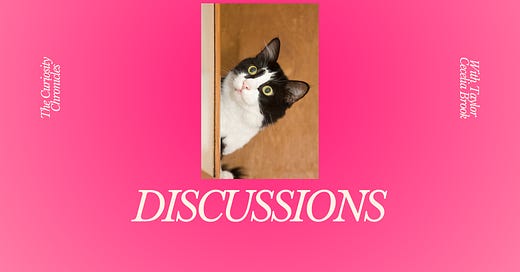Disclaimer: The Curiosity Chronicles are spoken by Taylor Cecelia Brook. That means you get her in her full form: Valley Girl who likes to cuss and talks at the speed of light :) I wont be offended it that’s not your jam :)
Thank you for listening to this weeks episode of The Curiosity Chronicles. If you would prefer to read instead of listen (no shame), the transcript is below :)
(00:00:01):
hello and welcome back to the curiosity chronicles i am your host taylor cecilia
(00:00:08):
brooke and today we're gonna dive into something a little bit more personal here
(00:00:13):
but i know a lot of people get curious about a lot of these things that i'm going
(00:00:16):
to talk about so um that's kind of been on my mind a lot lately and it's also been
(00:00:22):
the inspiration for today's episodes it was kind of like an aha light bulb after
(00:00:27):
all the things that had happened
(00:00:29):
in the last few weeks and today and whatever.
(00:00:33):
So right now we are,
(00:00:36):
when I initially started this podcast,
(00:00:38):
we were 11 days away from the anniversary of Lily's death.
(00:00:42):
We're now three days away.
(00:00:45):
So, you know, it took me some time to get here, but
(00:00:50):
we're about three days away.
(00:00:52):
And this time of year, it always brings up a lot of emotions for me.
(00:00:58):
I mean, obviously my kid died on this month, so it's really difficult, but this year,
(00:01:07):
I feel like I've been talking about her,
(00:01:08):
writing about her way more than I have probably since she was alive,
(00:01:14):
to be honest.
(00:01:16):
And I'm just trying to process all of that.
(00:01:18):
And even though it's been six years since she passed,
(00:01:22):
normally since she died,
(00:01:24):
I try not to say past because it's not about movement or a gallstone or a kidney stone,
(00:01:31):
you know.
(00:01:33):
Anyway, it's a digression.
(00:01:35):
Okay.
(00:01:37):
It's been six years, but normally around this time, the grief feels like almost tangible.
(00:01:43):
Like I can feel it layering onto my skin.
(00:01:46):
I can taste it.
(00:01:47):
I can smell it.
(00:01:48):
I can hear it.
(00:01:50):
I can like the insides of my chest walls can feel it.
(00:01:54):
Like it's crazy how much I can feel it.
(00:01:58):
But this year, it's not quite like that.
(00:02:02):
I feel like a lot of what's
(00:02:04):
I'm feeling is so different.
(00:02:08):
So quick digression.
(00:02:11):
Initially, I was planning on doing this as a car chat with Taylor Time.
(00:02:16):
But I quickly realized that I have a lot to say on this.
(00:02:21):
But it also deserves more space than a quick convo.
(00:02:25):
Because grief is heavy.
(00:02:27):
It's hard.
(00:02:28):
It's fucking super complicated emotionally.
(00:02:33):
And anyone who's lost someone knows how significant dates stir up those feelings.
(00:02:38):
It doesn't really matter what the date is.
(00:02:39):
Fourth of July really stirs up feelings for me.
(00:02:43):
And if you go back through my notes...
(00:02:45):
to 4th of July, you'll see, you know, I talked about that.
(00:02:49):
It's a hard, it was a hard day for me, but it's been better.
(00:02:53):
It was better this year.
(00:02:55):
So, you know.
(00:02:57):
It's interesting,
(00:02:59):
but there used to be around these types of dates,
(00:03:03):
this cloud that would just follow me around.
(00:03:07):
And when I was really dealing with the worst parts of chronic grief,
(00:03:12):
I felt like that cloud was just sitting on top of my head the whole time.
(00:03:16):
Like it never wanted to leave.
(00:03:17):
And it just sucked.
(00:03:19):
And I spent a good few years like that.
(00:03:21):
Yeah.
(00:03:24):
And like I said, this year is different.
(00:03:27):
And, you know, it's really been better than the previous years.
(00:03:31):
I don't know if it's because of the meds that I'm taking or all the work that I've
(00:03:36):
done on my mental health or that it's been six years so I'm further away from it or
(00:03:41):
I've just learned how to manage my emotions better.
(00:03:43):
It literally could be any or all of those reasons.
(00:03:49):
So like I'm just trying to piece together, you know,
(00:03:54):
What actions have I taken to make this year easier on myself?
(00:03:59):
But it's funny because this is what caused the reflection.
(00:04:04):
I had my psychiatry appointment today.
(00:04:12):
And, well, not literally today.
(00:04:14):
It was the day that I wrote all this stuff down.
(00:04:20):
I had my psychiatry appointment and we were talking and she asked me to explain,
(00:04:24):
you know,
(00:04:26):
what was going on with me.
(00:04:30):
And it really caused me to reflect on
(00:04:39):
which I had to do this quite quickly.
(00:04:41):
But it really caused me to reflect on what was actually different about the way I
(00:04:49):
was feeling and what did it remind me of.
(00:04:55):
And that is not something I normally would have done because one of the hardest
(00:05:05):
parts about grief for me is how it intertwines with
(00:05:10):
everything in life, like literally everything.
(00:05:13):
There's not a moment of your life that grief doesn't touch.
(00:05:19):
It's like this little stain that's always there.
(00:05:23):
And so you have that.
(00:05:25):
Just keep that in your head.
(00:05:27):
Lily died.
(00:05:28):
And six months later, I was pregnant again through IVF.
(00:05:35):
So my daughters are only 18 months apart, like almost exactly.
(00:05:41):
In fact, technically, one would say that they're one year, five months and 20 days apart.
(00:05:50):
So like that is close.
(00:05:54):
That was real, real fucking close.
(00:05:59):
And initially, I thought what was going on with me was just postpartum brain or pregnancy brain.
(00:06:06):
And it was some of that because some of that stuff did go away.
(00:06:10):
But a lot of it was grief brain.
(00:06:15):
And it took me a long time to not only realize how deeply my grief was affecting my well-being.
(00:06:25):
But to actually admit that, admit that, oh, this has an impact on my health.
(00:06:31):
Like not just my brain and emotional health,
(00:06:34):
no,
(00:06:34):
every part of my being,
(00:06:36):
it affects every single part of me.
(00:06:39):
But I couldn't see that for a long time because I just had a baby and that's a huge change on its own.
(00:06:45):
And then you add in that my kid just died less than a year ago.
(00:06:49):
Like we had, it was one year ago.
(00:06:56):
that Lily had been gone.
(00:06:59):
So we're at the end of June or July and three weeks later,
(00:07:04):
three and a half,
(00:07:05):
three and a half weeks later,
(00:07:08):
Lucy was born.
(00:07:10):
So like, I never really had time to truly mourn.
(00:07:17):
And, you know, I saw this a lot through my pregnancy with Lucy and I talk about
(00:07:25):
I'll talk a lot about that in the regular grief stage in my second book about plain old regular grief.
(00:07:37):
I'll be talking about some of the things that I did and how those...
(00:07:43):
Had I talked to someone,
(00:07:44):
they would have told me these were like warning signs like,
(00:07:46):
hey,
(00:07:47):
you're going in a bad direction.
(00:07:50):
But I obviously didn't talk to anyone.
(00:07:53):
And then my new baby was there and I was consumed by everything.
(00:07:59):
But this entire time,
(00:08:00):
from the time I got pregnant with Lily to all the way until like now,
(00:08:06):
I have struggled with inattentive ADD or whatever it's called.
(00:08:13):
However, my therapist thinks it's cortisol poisoning, which I find is a very interesting perspective.
(00:08:21):
But my focus is terrible.
(00:08:23):
So terrible that the other day I dented my car because I was being spacey.
(00:08:32):
The other day I forgot to lock my car and it got robbed.
(00:08:35):
I ate shit on my bike last Saturday because I just wasn't paying attention.
(00:08:41):
Like all these things adding up makes my life more challenging.
(00:08:44):
These are things that are happening this recently.
(00:08:47):
And so I've got, remember, we've got grief brain coming back in full force.
(00:08:52):
And then we've got like this extra spaciness that I normally don't have.
(00:08:57):
And then on top of that, getting out of bed has been so much of a struggle.
(00:09:03):
Normally, I'm a morning person.
(00:09:05):
But lately, in the last week and a half, it has been a struggle.
(00:09:10):
I don't want a human right now.
(00:09:12):
I just don't want to human.
(00:09:16):
And so I reflected on all of this and how I had acted in the years past to...
(00:09:23):
you know,
(00:09:23):
these time periods and such and such,
(00:09:25):
because that was the next question my psychiatrist asked me was how close are we to
(00:09:31):
that day and how different is it from when it was before?
(00:09:37):
And so after explaining to all of this, to my psychiatrist, who was phenomenal by the way, um,
(00:09:47):
She said, okay, I think we should up your mints for a little bit and see if that helps with the grief.
(00:09:54):
And I kind of paused and she was like, let me explain it a little bit so it makes more sense.
(00:09:59):
And so this is how she kind of explained it.
(00:10:03):
You know,
(00:10:03):
there's buoys in the ocean and even though they float and they can go up and down,
(00:10:09):
they're still attached to the seafloor.
(00:10:11):
So they don't just float away, right?
(00:10:14):
Or the lake floor, whatever.
(00:10:15):
Um,
(00:10:17):
But they'll float with the waves, they'll go down, they'll go up.
(00:10:22):
But at some point, there's going to be a big enough wave that it can't, that buoy can't meet the wave.
(00:10:28):
And it's going to have the wave crash right down on top of it.
(00:10:34):
Well, guess what?
(00:10:35):
That's where I am.
(00:10:37):
Wave has crashed.
(00:10:40):
So she said, let's up your...
(00:10:45):
Let's up your amends and see if that helps.
(00:10:47):
We don't have to stay there.
(00:10:48):
We can move back.
(00:10:49):
You know, it's fine.
(00:10:50):
But I think this just might help for a little bit.
(00:10:52):
And at first,
(00:10:54):
like internally,
(00:10:55):
my brain was kind of bummed because I really would like to try a stimulant for more
(00:11:01):
than just like one day.
(00:11:03):
Um,
(00:11:05):
But doctors and psychiatrists have been hesitant to prescribe me stimulants because
(00:11:10):
of my history with an eating disorder and body dysmorphia.
(00:11:14):
So it really sucks because like I really do get it.
(00:11:18):
And like I talked to my sister about it and she also gets it,
(00:11:21):
especially because she lost a fuck ton of weight when she started Adderall and she
(00:11:24):
has no eating issues like mine.
(00:11:25):
But like when I've taken it, when I've taken Adderall,
(00:11:34):
It's been incredible.
(00:11:37):
Like so fucking incredible.
(00:11:39):
There's nothing in my brain.
(00:11:41):
It's like I'm at the end of a run or at the end of a bike ride and I'm just there the whole time.
(00:11:46):
It doesn't need that stimulation anymore.
(00:11:50):
So right now it's like needing extra, extra, extra stimulation.
(00:11:53):
And I said this to my
(00:11:56):
my psychiatrist.
(00:11:57):
And she goes,
(00:11:58):
I don't,
(00:11:59):
I just don't think it's getting enough dopamine right now because it's all of its
(00:12:03):
normal levels are way different than it normally would.
(00:12:07):
But because you're,
(00:12:08):
you're craving dopamine so much,
(00:12:12):
that's why you're craving all the things that you're craving right now.
(00:12:16):
So after I reflected on that, um,
(00:12:21):
I kind of came to the conclusion that this is like the fourth or fifth time I've met with her.
(00:12:26):
And like,
(00:12:28):
she has not like really labeled me as having an attention deficit disorder,
(00:12:36):
which really it should be like a dopamine,
(00:12:41):
like processing disorder.
(00:12:43):
But anyway, um,
(00:12:48):
I realized that she never really talked about that with me.
(00:12:52):
And after... Then I started thinking about all of our conversations.
(00:12:56):
And I was like, I don't think she thinks I have ADHD.
(00:12:58):
And...
(00:13:01):
It's funny because the Friday before that, I had sent the same thing to my therapist.
(00:13:05):
She goes, you do not have ADHD or ADD.
(00:13:08):
You have anxiety, you have depression, and you have OCD.
(00:13:12):
And when all of them are at their all-time high, they act like ADHD and ADD.
(00:13:18):
But when they're not, you're not any of those things.
(00:13:21):
And I was just like, oh my God.
(00:13:23):
So it blew my mind up.
(00:13:25):
So now here we are.
(00:13:27):
I'm having...
(00:13:29):
to rely heavily on my organizational tools to keep things together.
(00:13:34):
And I'm just trying to give myself grace because like, this isn't forever.
(00:13:41):
This isn't permanent.
(00:13:42):
I think that's what used to be so very hard for me in times like these, because I didn't know anything.
(00:13:48):
I didn't know what to expect and I didn't know how to embrace it and just roll with
(00:13:53):
this fucking thing called life.
(00:13:55):
And so like,
(00:13:57):
Now I just know that I need to give myself grace and utilize the tools that I have
(00:14:01):
implemented over the last,
(00:14:02):
you know,
(00:14:03):
how many years that I've been working on this to keep myself organized.
(00:14:07):
And it's funny because I,
(00:14:10):
Growing up, my mom had like a million alarms for everything.
(00:14:13):
They all had like different like sounds and ringtones and songs and stuff.
(00:14:18):
And I never understood it at all.
(00:14:21):
And I hated them.
(00:14:22):
I felt like they were so annoying and so obnoxious.
(00:14:25):
Joke's on me.
(00:14:26):
I get it now.
(00:14:29):
And I have alarms and calendar reminders for fucking everything.
(00:14:32):
Like fucking everything.
(00:14:35):
Everything.
(00:14:36):
Even to go to bed.
(00:14:36):
Yes, even to go to bed.
(00:14:38):
I got that idea from the Happier podcast with Gretchen Rubin,
(00:14:42):
which you should definitely check out if you haven't.
(00:14:44):
But it's one of the best changes I've ever made because it eliminates the need to
(00:14:48):
constantly check the time.
(00:14:50):
Um, and so really why I put this episode out here was to say a few different things.
(00:14:58):
If you're neurodivergent, your, your life is going to go with, it's a rolling hill.
(00:15:04):
Like you're going to have ups and downs.
(00:15:05):
That's just how it works.
(00:15:07):
So when you're in a down spot,
(00:15:08):
I think one of the biggest things that I have learned in the last two years is when
(00:15:15):
you have low spoons,
(00:15:17):
That's okay.
(00:15:18):
Use your tools that get you more spoons.
(00:15:22):
You know, for me, I might drink a little bit more caffeine than normal.
(00:15:26):
Not the best one.
(00:15:27):
I use my calendars even more heavily.
(00:15:29):
I use notes and lists and alarms and timers for everything.
(00:15:35):
Now, I don't always need it.
(00:15:37):
Like,
(00:15:38):
not every day do I need to do the Pomodoro method at work while I'm working,
(00:15:42):
but lately I have to because that's what gets me through because...
(00:15:46):
my ability to think the same is compromised right now.
(00:15:51):
And so I wanted to provide those reminders for people who are neurodivergent.
(00:15:55):
But if you are in a cycle of grief or you are neurodivergent and have chronic grief
(00:16:02):
or grief,
(00:16:03):
or you've just experienced something traumatic,
(00:16:05):
like please try to give yourself grace.
(00:16:08):
And it's okay if you need to do something that helps you get you through this time.
(00:16:13):
That does not mean you can abuse your substances of any form.
(00:16:17):
However, let's all be realistic.
(00:16:20):
There's a difference between using a little bit more and abusing.
(00:16:25):
If you use a little bit more than usual, that's okay.
(00:16:28):
But let's not abuse it.
(00:16:29):
That was a weird little digression.
(00:16:31):
We are 16 minutes into this podcast, almost 17.
(00:16:36):
So if anything I said today resonates with you,
(00:16:41):
I would love it if you shared it,
(00:16:43):
tell people why you like it.
(00:16:45):
Or you can reach out to me, leave a comment, restack it, anything like that if you're on Substack.
(00:16:50):
I'm on Instagram, Spotify, Apple, all of those things.
(00:16:54):
So thank you for tuning in to today's episode of the Curiosity Chronicles.
(00:16:58):
And I will see you next time.
(00:17:01):
Bye.














Share this post